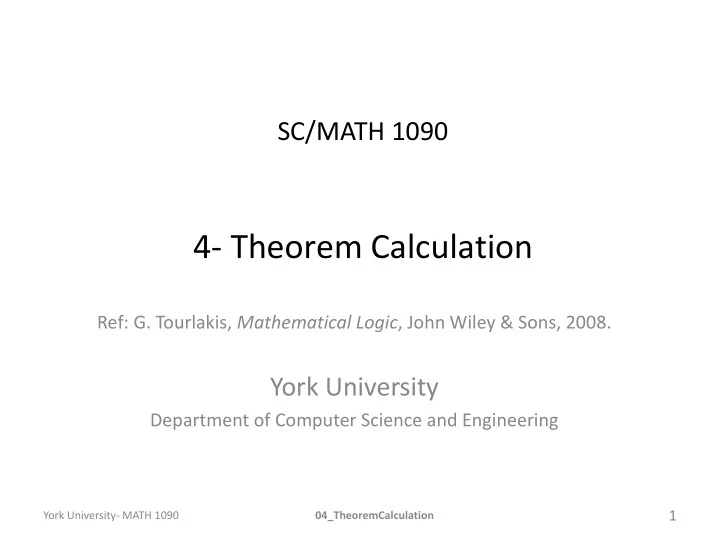

SC/MATH 1090 4- Theorem Calculation Ref: G. Tourlakis, Mathematical Logic , John Wiley & Sons, 2008. York University Department of Computer Science and Engineering 1 York University- MATH 1090 04_TheoremCalculation
Overview • Logical axioms • Rules of inference • Theorem Calculations, or Proofs • Hilbert-style Proofs York University- MATH 1090 04_TheoremCalculation 2
Logical axioms of Boolean Logic York University- MATH 1090 04_TheoremCalculation 3
Axioms • We will use the capital Greek letter "lambda" , , to denote the set of all logical axioms . • Note that since the logical axioms (shown in previous slide) are schemata, is infinite. • All assumptions or hypotheses for a specific problem, are called special axioms or nonlogical axioms and are denoted by "gamma", . • Note that is not fixed. York University- MATH 1090 04_TheoremCalculation 4
Primary Rules of Inference • The numerator shows the premises , hypotheses , or assumptions . • The denominator shows the conclusion or result of the rule. • The first rule is the rule of Equanimity or Eqn. • The second rule is the Leibniz rule or Leib. York University- MATH 1090 04_TheoremCalculation 5
Theorem Calculations, or -Proofs • Let be a given set of formulae (our assumptions) • A theorem-calculation (or proof) from is any finite (ordered) sequence of formulae that can be written following these rules: 1. We may write a formula from or at any step 2. We may write the denominator of an instance of an inference rule , provided all formulae in the numerator (of the same instance) have been written in a previous step. York University- MATH 1090 04_TheoremCalculation 6
Theorem • Definition. (Theorems) Any formula A that appears in a -proof is called a -theorem. This is denoted by ⊢ A. – The above proof is said to prove A from . – If = (empty set), we write ⊢ A, and call A just a theorem or an absolute theorem, or logical theorem. York University- MATH 1090 04_TheoremCalculation 7
Hilbert-Style Proof - framework • To Prove ⊢ A: (1) ...... <annotation> (2) ...... <annotation> Steps in a theorem calculation (n) A <annotation> • Annotations explain the step written in a proof. • In a Hilbert style proof, conclusion appears at the last step (although by definition, it is not wrong to have more (unnecessary!) steps). York University- MATH 1090 04_TheoremCalculation 8
Some simple theorems a) ⊢ A A b) A ⊢ A c) A, A B ⊢ B d) A B ⊢ C[ p :=A] C[ p :=B] e) A B, B C ⊢ A C Transitivity ⊢ A A f) York University- MATH 1090 04_TheoremCalculation 9
Strengthening metatheorems! • Metatheorem. (Hypothesis Strengthening) If ⊢ A and , then also ⊢ A. – If ⊢ A , then also ⊢ A for any set of formulae . • Metatheorem. (Transitivity of ⊢ ) Assume we have ⊢ B 1 , ⊢ B 2 , ..., ⊢ B n Then ⊢ A. and B 1 , B 2 , ..., B n ⊢ A • Corollary. If ∪ {A} ⊢ B and also ⊢ A , then ⊢ B. • Corollary . If ∪ {A} ⊢ B and also ⊢ A , then ⊢ B. York University- MATH 1090 04_TheoremCalculation 10
More tools for our toolbox a) B, A B ⊢ A The other Eqn! b) ⊢ ⊢ ┬ c) d) C[p:=A], A B ⊢ C[p:=B] Eqn + Leib merged e) ⊢ ( A (B C)) (( A B) C) ⊢ A A B B f) ⊢ B B – ⊢ A A – York University- MATH 1090 04_TheoremCalculation 11
Redundant True • Redundant True Theorem: ⊢ ┬ A A and ⊢ A A ┬ • (Redundant True) Metatheorem . For any and A, ⊢ A iff ⊢ A ┬ . – Special case: A ⊢ A ┬ • Metatheorem . For any , A , and B, if ⊢ A and ⊢ B , then ⊢ A B. York University- MATH 1090 04_TheoremCalculation 12
Recommend
More recommend